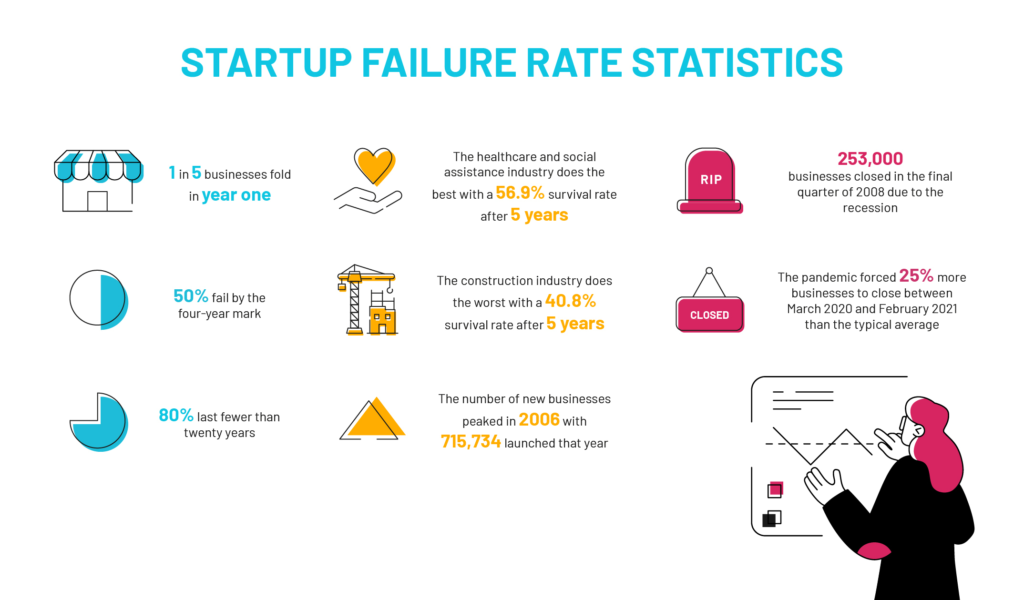
The Enigma of Startup Failures
The Enigma of Startup Failures https://theraise.eu/wp-content/uploads/2024/04/Startup-failure-rate-stats-1024x600.png 1024 600 RAISE fosters startup growth and scale-up within and across Europe RAISE fosters startup growth and scale-up within and across Europe https://theraise.eu/wp-content/uploads/2024/04/Startup-failure-rate-stats-1024x600.pngIn the swirling vortex of entrepreneurial dreams and ambitions, there exists a sobering truth: the vast majority of startups fail. Behind every celebrated success story lies a trail of shattered hopes, dashed aspirations, and hard-earned lessons. But why do startups, fueled by passion and innovative zeal, often find themselves on the path to oblivion rather than the pinnacle of success?
The landscape of entrepreneurship is riddled with complexities, akin to navigating a labyrinth fraught with unforeseen obstacles. While each startup’s journey is unique, common threads weave through the fabric of failure, offering insights into its enigmatic nature.
First and foremost among these threads is the elusive quest for product-market fit. Despite meticulous market research and fervent belief in their vision, many startups struggle to resonate with their target audience. The disconnect between product offerings and market demands often spells doom, leaving founders grappling with the harsh reality of consumer indifference.
Furthermore, the siren song of premature scaling lures many startups into treacherous waters. Seduced by the allure of rapid growth and inflated valuations, founders may expand their operations hastily, only to encounter the harsh reality of unsustainable overheads and dwindling resources. In their fervor to conquer new horizons, they neglect the fundamental principle of establishing a robust foundation before scaling their business.
Financial mismanagement emerges as another Achilles’ heel for startups, casting a shadow over even the most promising ventures. Whether due to inadequate funding, reckless spending, or unforeseen expenses, financial woes can cripple a startup’s prospects, forcing them to shutter their doors prematurely.
Yet, beyond the tangible pitfalls lies a subtler, more insidious threat: founder hubris. The intoxicating cocktail of ego and overconfidence blinds many entrepreneurs to the warning signs of impending failure. They dismiss constructive criticism, ignore market feedback, and cling stubbornly to their original vision, even as the tides of fortune turn against them.
Moreover, the volatile nature of the startup ecosystem exacerbates the challenges faced by fledgling ventures. Fierce competition, disruptive technologies, regulatory hurdles, and economic downturns loom like specters on the horizon, casting a pall of uncertainty over the entrepreneurial landscape.
In the face of such formidable odds, it becomes evident that navigating the treacherous waters of startup entrepreneurship requires more than just vision and ambition. It demands resilience, adaptability, and a willingness to confront harsh realities head-on. Failure, far from being a final verdict, serves as a crucible for growth and enlightenment, paving the way for future success.
Indeed, behind every failed startup lies a trove of invaluable lessons waiting to be unearthed. From the ashes of defeat emerge seasoned entrepreneurs, armed with wisdom forged in the crucible of adversity. They understand that success is not merely a destination but a journey fraught with challenges and setbacks.
In the grand tapestry of entrepreneurship, failure serves as a poignant reminder of the fragility of human endeavor. It compels us to confront our limitations, embrace humility, and forge ahead with renewed vigor and determination. For in the crucible of failure lies the seed of resilience, the catalyst for transformation, and the promise of future triumphs.
Photo via Tech.co
- Posted In:
- Startup News




